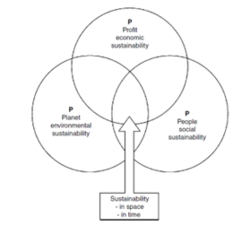Sustainability Issue
Contents |
Abstract
In order to find the solution to a problem, first of all it is needed to accept the problem as true and relevant. Although in previous years the problem of ecological impact was not known, not only the damage to the atmosphere, but also the consequences on society, nowadays, the increase of sustainability in companies’ strategy and goals provide a promising future. In this frame of reference, companies have a key role to play due to their great influence in society thanks to their campaigns based on the idea of satisfying the needs of the customer by means of the product and the whole cluster of things associated with creating, delivering and finally consuming it.
Taking into consideration sustainability requirements, it is needed a change in the field of project management from the perspective of time, budget, and quality to social, environmental, and economic [1]. The change in the paradigm of project management is one of the essentials aspects for which sustainability plays a relevant role. This change is based on moving from predictability and controllability to an environment based on flexibility, opportunity, and complexity. Considering sustainability, it requires a change of mentality from the part of the project manager, for instance, it is not only necessary to provide the expected results but also to assume the responsibility for the long-term growth of organizations and society [2]. In order to find the balance between economic knowledge, social well-being and the rational use of natural resources, sustainable development is necessary and companies are incorporating it into their respective spheres of influence. Sustainability gives to the organization a huge competitive advantage, an improvement in relations with its stakeholders to the organization and contributes to support declining resources.
Sustainability
Concept
Sustainability has developed quickly over the past few years but there is still a problem of how to implement sustainability into practice to get positive results and overcome the barriers that face organisations and project teams [3]. In order to get a broader perspective, sustainability can be defined as “The development that meets the needs of the present without compromising the ability of future generations to meet their own needs” [4]. This definition attempts to address the complex relationship between the environment, people, and development as well as that between the past, present and the future generations.
Sustainable Development Goals (SDG)
Implementation of Sustainability
Project Management
Overview
Stakeholder analysis
Project Manager
Methodology
Limitations
References
- ↑ BANADUC, G., MIREA, N. y DRAGHICI, A., 2022. Points of intersection between sustainability and project management. MATEC Web of Conferences, vol. 373, pp. 78-. ISSN 2261-236X. DOI 10.1051/matecconf/202237300078
- ↑ UKAGA, O., 2014. Gilbert Silvius, Ron Schipper, Julia Planko, Jasper van den Brink and Adri Kohler: Sustainability in project management: Grower Publishing Limited, Surrey, England, 2012, ISBN 978-1-4094-3169-5. 2014. Dordrecht: Springer Netherlands.
- ↑ Talbot, J., & Venkataraman, R. (2011). Integration Of Sustainability Principles Into Project Baselines Using A Comprehensive Indicator Set. The international Business & Economics Research Journal , 10 (9), 29.
- ↑ Brundtland, G.B. (1987): Our common future: World Commission on Environment and Development, Oxford University press; p.54.
- ↑ Lecture 1: 42402 – Sustainable Operations and Supply Chain Management. Sustainability and the role of Operations and Supply Chain Management